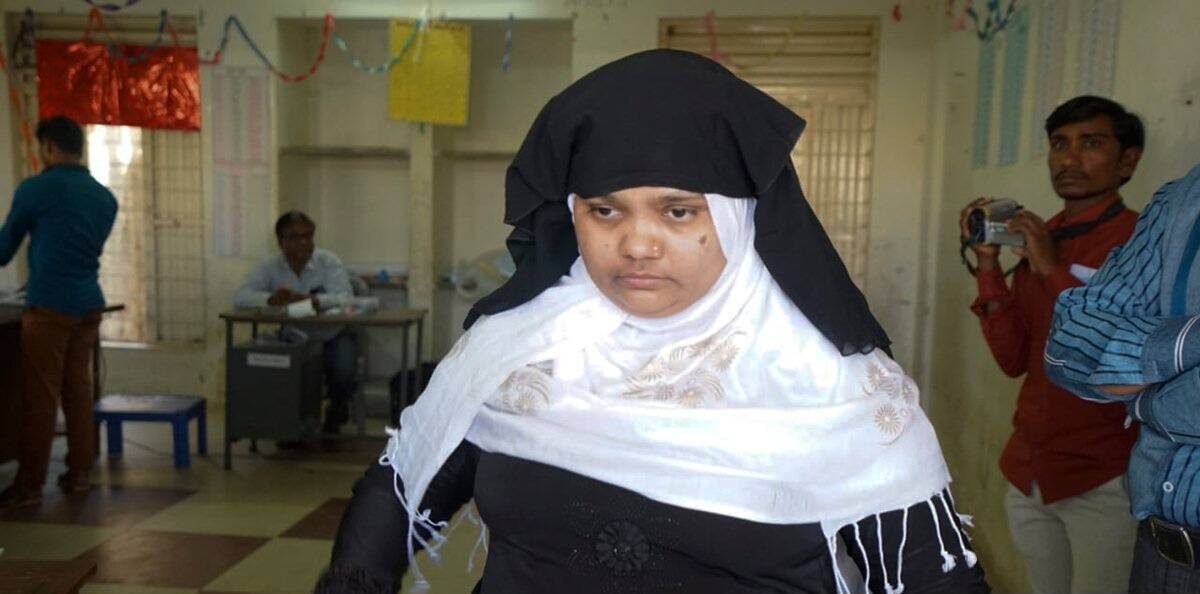On Tuesday, the Supreme Court was unable to hear Bilkis Bano’s petition challenging the commutation of 11 convicts’ sentences in the gang-rape case by the Gujarat government, because the judges involved were hearing a case concerning passive euthanasia as part of a five-judge Constitution bench.
Bilkis Bano, who was gang-raped and had seven members of her family murdered during the Gujarat riots of 2002, was due to have her appeal heard on Tuesday by Justices Ajay Rastogi and CT Ravikumar.
However, Justices Rastogi and Ravikumar were engaged hearing, as part of a Constitution bench presided over by Justice K M Joseph, the petitions requesting a change to the standards governing the execution of a “Living Will or Advance Medical Directive” in order to legalise passive euthanasia.
The registry of the supreme court will announce a new hearing date.
On November 30, 2022, Bilkis Bano challenged the state government’s decision to award remission of sentence to eleven convicts, arguing that their early release “shook the conscience of society.”
In addition to the lawsuit contesting the release of the prisoners, the gang-rape survivor also filed a separate petition requesting a review of the supreme court’s May 13, 2022 ruling on a convict’s plea.
In its order dated 13 May 2021, the highest court instructed the state government to assess a convict’s request for early release in accordance with its policy enacted on 9 July 1992, which was in effect on the day of conviction, and make a decision within two months.
The Gujarat government pardoned and released all eleven offenders on August 15 of last year.
The highest court denied her petition for reconsideration in December of last year.
In her pending appeal, the victim asserts that the state government issued a “mechanical order” in blatant disregard of the Supreme Court’s stipulations.
“The mass premature release of the criminals in the much-discussed Bilkis Bano case has shook the conscience of the society and sparked a number of protests around the country,” she argued in the petition.
Referring to earlier decisions, the defence argued that mass remissions are not possible and, furthermore, that such a relief cannot be sought or given as a matter of right without evaluating the case of each offender individually on the basis of their unique circumstances and role in the crime.
“The present writ petition challenges the decision of the State/Central Government granting remission to all 11 convicts and releasing them prematurely in one of the most heinous crimes of extreme inhuman violence and brutality by a group of human beings against another group of human beings, all helpless and innocent people – most of them were either women or minors, by chasing them for days together persuaded by hatred towards a particular community,” it said.
The plea, which provided minute details of the crime, stated that Bilkis and her adult daughters were “stunned by this unexpected turn of events.”
Citizens, both domestically and globally, were shocked by the government’s decision, and all segments of society expressed “anger, disillusionment, and mistrust” and criticised the government’s leniency.
“When the nation was celebrating its 76th Independence Day, all the convicts were released prematurely and were garlanded and felicitated in full public view and sweets were distributed and this is how the present petitioner along with the entire nation and the entire world came to know about the shocking news of the premature release of all the convicts (respondents no. 3-13) of one of the most heinous crimes this country has ever seen of multiple time gang rape of a pregnant woman.”
It alluded to a widespread virtual public demonstration in each city, on all social media platforms, news networks, and portals.
“It was also widely known that Muslims in the area fled Rahimabad in dread after the release of these 11 convicts,” the petition stated.
CPI(M) leader Subhashini Ali, Revati Laul, an independent journalist, Roop Rekha Verma, a former vice chancellor of Lucknow University, and TMC MP Mahua Moitra have already filed PILs against the release of the inmates.
Bilkis Bano was five months pregnant and 21 years old when she was gang-raped while fleeing the riots that broke out following the destruction of the Godhra train. Her three-year-old daughter was among the seven members of her family who perished.
The Supreme Court delegated the investigation of the case to the CBI and assigned the trial to a court in Maharashtra.
On January 21, 2008, a special CBI court in Mumbai sentenced eleven individuals to life imprisonment on accusations of gang-raping Bilkis Bano and murdering seven members of her family.
The Supreme Court and the Bombay High Court later upheld their conviction.
The eleven individuals convicted in the crime were released from the Godhra sub-jail on August 15 pursuant to the Gujarat government’s pardon policy. They had served over 15 years in prison.
